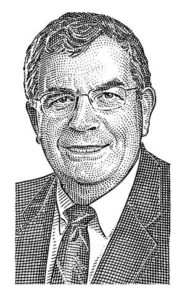 Article by Dr. Sinclair Ferguson (original source here)
Article by Dr. Sinclair Ferguson (original source here)
The Reformers placed tremendous stress on the gifts of the Spirit to the whole body of Christ. John Calvin himself has rightly been described as “the theologian of the Holy Spirit” (B.B. Warfield). Yet Reformed Christians always have been given a “bad press” for their views on the gifts of the Holy Spirit.
Our conviction is that God purposefully gave some gifts (specifically the ability to work miracles, the gift of revelatory prophecy, and speaking in tongues) only for a limited period. We have solid biblical reasons for believing this:
1. A temporary manifestation of these gifts is characteristic of God’s pattern of working. Contrary to popular opinion, such gifts as these were given spasmodically in biblical history. Their occurrence is generally contained within a handful of time periods lasting around a generation each.
2. The function of these gifts, namely to convey and to confirm revelation (now ceased until Christ’s return), is underlined in the New Testament itself (Acts 2:22, 14:3; cf. 2 Cor. 12:12; Heb. 2:3–4).
3. The history of the New Testament suggests that by the close of the apostolic age the role of these gifts was being superseded by the completion of the New Testament. Thus, there is no reference to their presence—or, more significantly, their future regulation—in the Pastoral Letters.
More could be said here in terms of biblical Christology, for the outpouring of the gifts of tongues, prophecy, and miracles at Pentecost was specifically intended to mark the coronation of Christ. It was, therefore, inherently intended to be a non-permanent feature of the life of the church. But in this context, it probably is more important to emphasize another, often-ignored facet of Reformed teaching. It is well-expressed in some words of the great Puritan John Owen:
Although all these gifts and operations ceased in some respect, some of them absolutely, and some of them as to the immediate manner of communication and degree of excellency; yet so far as the edification of the church was concerned in them, something that is analogous unto them was and is continued.
What does this mean? Simply this: It is the same Spirit who gives both temporary and continuing gifts to the church. We should not be surprised, therefore, to discover common threads in both.
Perhaps the most important common thread is the Spirit’s ministry in illumination—He enlightens our minds to enable us to know, see, grasp, and apply the will and purposes of God. There was an immediacy to illumination in the temporary gifts. The Spirit taught the apostles “all things” (John 14:26) and led them into “all truth” (John 16:13). Now, however, He continues this work in us through the Scriptures He enabled the apostles to write for us.
Indeed, during the Farewell Discourse (John 14–16), our Lord made it clear to the apostles that this would be one of the central ministries of the Spirit in their lives: He would remind them of what Jesus had said (the gospels), lead them into the truth (the epistles), and show them the things to come (e.g. Revelation).
Why, then, are Christians today—in contrast to their fathers—so thirsty to experience immediate revelation from God, when His desire for us is the ongoing work of the Spirit opening up our understanding through the mediated revelation of the New Testament? There seem to be three reasons:
1. It is more exciting to have direct revelation rather than Bible revelation. It seems more “spiritual,” more “divine.”
2. For many people, it feels much more authoritative to be able to say, “God has revealed this to me” than to say, “The Bible tells me so.”
3. Direct revelation relieves us of the need for painstaking Bible study and careful consideration of Christian doctrine in order to know the will of God. In comparison to immediate revelation, Bible study seems—to be frank—boring.
Lest we be brow-beaten and develop a kind of siege mentality as Reformed Christians, here are some things we should bear in mind about the work of illumination:
1. Jesus experienced it. Yes, our Lord prophesied; yes, He worked miracles. But we would be guilty of Docetism (the view that Jesus’ humanity only seemed to be like ours) and untrue to Scripture if we failed to recognize that Jesus Himself grew in wisdom and favor with God (Luke 2:52) by patiently meditating on the Old Testament Scriptures. (I suspect He probably knew them by heart.) The third Servant Song of Isaiah (Isa. 50:4–11) gives us an extraordinarily moving picture of the Lord Jesus waking up each day, dependent on His Father to illumine His understanding of His Word that He might think, feel, act, and live as the Man full of the Spirit of wisdom and understanding (Isa. 11:2ff).
2. This is the divine method that produces authentic Christian growth, because it involves the renewal (not the abeyance) of the mind (Rom. 12:2) and it is progressive (it takes time and demands the obedience of our wills). Sometimes God does things quickly. But His ordinary way is to work slowly and surely to make us progressively more like our Lord Jesus.
3. The result of the Spirit working with the Word of God to illumine and transform our thinking is the development of a godly instinct that operates in sometimes surprising ways. The revelation of Scripture becomes, in a well-taught, Spirit-illumined believer, so much a part of his or her mindset that the will of God frequently seems to become instinctively and even immediately clear—just as whether a piece of music is well or badly played is immediately obvious to a well-disciplined musician. It is this kind of spiritual exercise that creates discernment (see Heb. 5:11–14).
Well-meaning Christians sometimes mistake the Spirit’s work of illumination for revelation, which, unhappily, can lead to serious theological confusion and potentially unhappy practical consequences. But the doctrine of illumination also helps us explain some of the more mysterious elements in our experience without having to resort to the claim that we have the gift of revelation and prophecy. Here the late John Murray spoke with great wisdom: “As we are the subjects of this illumination and are responsive to it, and as the Holy Spirit is operative in us to the doing of God’s will, we shall have feelings, impressions, convictions, urges, inhibitions, impulses, burdens, resolutions. Illumination and direction by the Spirit through the Word of God will focus themselves in our consciousness in these ways. We are not automata.… We must not think [these things] are … necessarily irrational or fanatically mystical.”
God’s Word, illumined by God’s Spirit, is, as Psalm 119 so magnificently shows, the pathway to spiritual stability and liberty. It leads us unwaveringly to knowing, loving, and doing God’s will on a daily basis. It brings joy through light.

